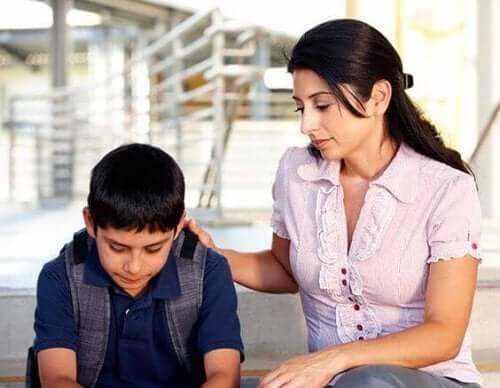Why It's Important to Know Children's Rights


Reviewed and approved by the psychologist María Alejandra Castro Arbeláez
Defending our children is one of our top priorities as parents. Here, we’ll explain some reasons why it’s so important to know children’s rights.
As human beings, we all have basic human rights. However, children have their own, which are adjusted to their particular reality. In fact, they’re subjects of priority and protection by national and international law.
For this reason, their rights are a priority for all the adults around them. As parents, we must not only know children’s rights, but it’s also vital to teach them to our sons, daughters, and students so that they are aware of them.
Here are 5 reasons to keep in mind regarding the rights of your little ones.
Children are thinking beings who deserve their rights to be guaranteed.
1. Respect our children the same way we do adults
Many times, we believe that because we’re adults, we know everything. When it comes time to have children, we think that they just have to be obedient because we assume they don’t know “enough”.
There’s nothing further from reality than this mistaken idea. Little ones, see, feel, suffer, and draw their own conclusions from their capabilities. Although they have limited concepts, they can understand what’s happening around them.
Most of the time, we forget the importance of listening to them and respecting their voices. Therefore, knowing children’s rights allows us to remember that they’re conscious beings and that their opinion also has value.
Raising a child that’s aware of their freedom is guaranteeing a good citizen in the future
2. Don’t forget that they’re free beings

No matter how young they are, children are free, and this is established in the declaration of their rights. This principle is contained in various national laws and constitutions. Freedom can’t be overlooked, it¡s real and legal.
Every child is under the care and responsibility of their parents. This means that we’re not their owners, but rather their protectors and the guarantors of their well-being. As parents, we must never censor or deprive them of what belongs to them.
On the contrary, our job is to understand them and give them the tools so that they can progressively use their freedoms in the future. This notion is sometimes forgotten when we exercise some role of authority. Be careful!
Let’s help reduce the violation of the rights of minors
3. Defend children whose rights have been violated
Most of us treat our children with great love and fulfill their basic and complementary needs. However, we’ve all seen a child in a precarious situation or victim of some abuse.
The truth is that there are abandoned, poorly cared for, mistreated, and deprived children everywhere. There are parents who don’t treat their own children well and we see them on the streets every day. Let’s not be complicit. Report these cases!
As adults, it’s possible to take care of all children. If we observe a little one going through this type of predicament, our duty is to contact the authorities and report the culprits. You could save an innocent life at any moment.
Timely care makes the difference between life and death
4. Give them advantages in the face of difficulties
It’s very common to cite the right that states that a child should be among the first to receive help under any circumstance. This shows that they’re the social priority in any emergency.
For example, your little one has health problems and requires emergency care, the medical center they go to is obliged to attend to them immediately. Neither money nor the number of people should get in the way when it comes to children.
The same is true for any crime, abuse, need for legal advice, and natural catastrophe. First, because children are weaker, and second, because they’re the future.
Motivate them to learn and you’ll reinforce their instinct for protection
5. Teach them and help them protect themselves

Ideally, as a conscious mother, you first know children’s rights so that you can later teach them and thereby help your children clarify their scope and meaning. By knowing their rights, your children will understand how valuable they are and their self-esteem will increase to 100%.
Later, they themselves will be the guardian of their rights, preventing other people from hurting them. Your children will inform you of any irregular situation that happens to them, and that will allow you to act to defend them.
Soon, they’ll also pass on their teachings to their friends. This is like a domino effect that will optimize the protection of our little ones. Building a better world is in your hands.
A review of the Convention on the Rights of the Child
This document, ratified by all States, contains 54 articles and was approved by the United Nations General Assembly on November 20, 1989. Its principles are:
- The right to equality, without distinction of race, religion, or nationality.
- The right to have special protection for the physical, mental, and social development of the child.
- The right to a name and a nationality from birth.
- The right to adequate food, shelter, and medical care.
- The right to education and special treatment for those children who suffer from a mental or physical disability.
- The right to the understanding and love of parents and society.
- The right to recreational activities and free education.
- The right to be among the first to receive help in any circumstance.
- The right to protection against any form of neglect, cruelty, and exploitation.
- The right to be raised in a spirit of understanding, tolerance, friendship between peoples, and universal brotherhood.
Organisms that ensure the protection of children, such as UNICEF, state that adults have the responsibility to take care of them and meet their needs. At the same time, governments must be careful when issuing their policies, because they all affect children in some way.
They’re also affected by global phenomena such as climate change, digitization, migration, and employment patterns, as well as transformations in the family structure.
Children’s early experiences are deeply involved in their development, which will ultimately determine the course of society. As you can see, it’s extremely important to know children’s rights.
Defending our children is one of our top priorities as parents. Here, we’ll explain some reasons why it’s so important to know children’s rights.
As human beings, we all have basic human rights. However, children have their own, which are adjusted to their particular reality. In fact, they’re subjects of priority and protection by national and international law.
For this reason, their rights are a priority for all the adults around them. As parents, we must not only know children’s rights, but it’s also vital to teach them to our sons, daughters, and students so that they are aware of them.
Here are 5 reasons to keep in mind regarding the rights of your little ones.
Children are thinking beings who deserve their rights to be guaranteed.
1. Respect our children the same way we do adults
Many times, we believe that because we’re adults, we know everything. When it comes time to have children, we think that they just have to be obedient because we assume they don’t know “enough”.
There’s nothing further from reality than this mistaken idea. Little ones, see, feel, suffer, and draw their own conclusions from their capabilities. Although they have limited concepts, they can understand what’s happening around them.
Most of the time, we forget the importance of listening to them and respecting their voices. Therefore, knowing children’s rights allows us to remember that they’re conscious beings and that their opinion also has value.
Raising a child that’s aware of their freedom is guaranteeing a good citizen in the future
2. Don’t forget that they’re free beings

No matter how young they are, children are free, and this is established in the declaration of their rights. This principle is contained in various national laws and constitutions. Freedom can’t be overlooked, it¡s real and legal.
Every child is under the care and responsibility of their parents. This means that we’re not their owners, but rather their protectors and the guarantors of their well-being. As parents, we must never censor or deprive them of what belongs to them.
On the contrary, our job is to understand them and give them the tools so that they can progressively use their freedoms in the future. This notion is sometimes forgotten when we exercise some role of authority. Be careful!
Let’s help reduce the violation of the rights of minors
3. Defend children whose rights have been violated
Most of us treat our children with great love and fulfill their basic and complementary needs. However, we’ve all seen a child in a precarious situation or victim of some abuse.
The truth is that there are abandoned, poorly cared for, mistreated, and deprived children everywhere. There are parents who don’t treat their own children well and we see them on the streets every day. Let’s not be complicit. Report these cases!
As adults, it’s possible to take care of all children. If we observe a little one going through this type of predicament, our duty is to contact the authorities and report the culprits. You could save an innocent life at any moment.
Timely care makes the difference between life and death
4. Give them advantages in the face of difficulties
It’s very common to cite the right that states that a child should be among the first to receive help under any circumstance. This shows that they’re the social priority in any emergency.
For example, your little one has health problems and requires emergency care, the medical center they go to is obliged to attend to them immediately. Neither money nor the number of people should get in the way when it comes to children.
The same is true for any crime, abuse, need for legal advice, and natural catastrophe. First, because children are weaker, and second, because they’re the future.
Motivate them to learn and you’ll reinforce their instinct for protection
5. Teach them and help them protect themselves

Ideally, as a conscious mother, you first know children’s rights so that you can later teach them and thereby help your children clarify their scope and meaning. By knowing their rights, your children will understand how valuable they are and their self-esteem will increase to 100%.
Later, they themselves will be the guardian of their rights, preventing other people from hurting them. Your children will inform you of any irregular situation that happens to them, and that will allow you to act to defend them.
Soon, they’ll also pass on their teachings to their friends. This is like a domino effect that will optimize the protection of our little ones. Building a better world is in your hands.
A review of the Convention on the Rights of the Child
This document, ratified by all States, contains 54 articles and was approved by the United Nations General Assembly on November 20, 1989. Its principles are:
- The right to equality, without distinction of race, religion, or nationality.
- The right to have special protection for the physical, mental, and social development of the child.
- The right to a name and a nationality from birth.
- The right to adequate food, shelter, and medical care.
- The right to education and special treatment for those children who suffer from a mental or physical disability.
- The right to the understanding and love of parents and society.
- The right to recreational activities and free education.
- The right to be among the first to receive help in any circumstance.
- The right to protection against any form of neglect, cruelty, and exploitation.
- The right to be raised in a spirit of understanding, tolerance, friendship between peoples, and universal brotherhood.
Organisms that ensure the protection of children, such as UNICEF, state that adults have the responsibility to take care of them and meet their needs. At the same time, governments must be careful when issuing their policies, because they all affect children in some way.
They’re also affected by global phenomena such as climate change, digitization, migration, and employment patterns, as well as transformations in the family structure.
Children’s early experiences are deeply involved in their development, which will ultimately determine the course of society. As you can see, it’s extremely important to know children’s rights.
All cited sources were thoroughly reviewed by our team to ensure their quality, reliability, currency, and validity. The bibliography of this article was considered reliable and of academic or scientific accuracy.
- Casas-Muñoz, A., & Loredo-Abdalá, A. (2014). ¿ Por qué debemos conocer los derechos de niñas, niños y adolescentes?. Acta pediátrica de México, 35(6), 437-439. https://www.medigraphic.com/pdfs/actpedmex/apm-2014/apm146a.pdf
- MacCormick, N. (1988). Los derechos de los niños: una prueba de fuego para las teorías de los derechos. Anuario de filosofía del derecho, (5), 293-306. https://dialnet.unirioja.es/descarga/articulo/142142.pdf
This text is provided for informational purposes only and does not replace consultation with a professional. If in doubt, consult your specialist.








